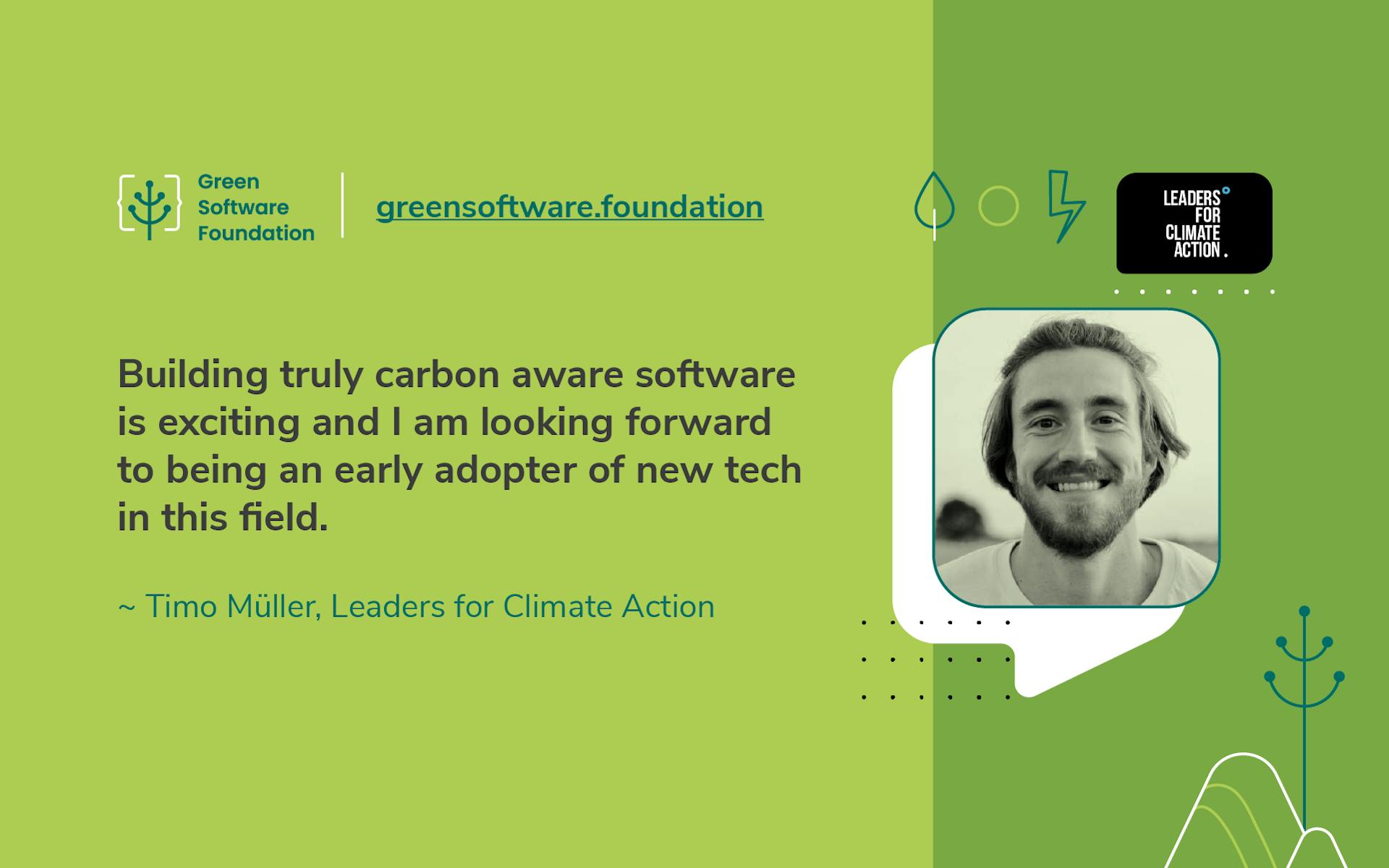In this second interview in the GSF Org Leads series, Timo Muller of Leaders for Climate Action (LFCA) talks to us about how joining hands with Green Software Foundation helps spread the message of green software more effectively.
Tell us about LFCA and what your organization expects to achieve from the association with the Green Software Foundation.
Leaders for Climate Action is a community of entrepreneurs and their companies uniting to drive impactful climate action in their organisations and beyond. Today we are more than 1500 companies and are operating on a global scale. Our members commit to ambitious climate goals and we provide them with everything they need to achieve these goals.
We look at climate action through a community lense. We don't provide individual consulting to companies. Instead, we split our community into sectors, provide these with concrete action items on our platform and help them through the implementation phase by building small mastermind groups with peers. Additionally we drive campaigns and speak up on a political level as representatives of a forward thinking industry.
We work with a lot of companies from the digital sector and are therefore very aware of the specific challenges that we are facing as an industry. The high demand and corresponding growth of digital services is causing an ever-increasing footprint of our economy.
By cooperating with the Green Software Foundation we hope to accelerate the transition towards a digital economy that runs entirely on renewable energy. As a player between the private and public sector, we can help to increase adaption of new technology in the field and are already working on a few interesting initiatives in this space. While we see the challenges, we also see our industry as a potential frontrunner and enabler of the much needed broad transition of our economies.
Tell us about your career path, interest in green software and your journey to GSF.
I studied computer science and have been building digital products ever since I learned how to use a computer. I dropped out of university to found my first startup. After living through all the ups and downs of the startup world, we sold our company to a competitor. I have worked there for 2 years as their Head of Product.
During those years I started realising that we are facing an environmental crisis that is far too big to ignore. I began to question my personal lifestyle choices, stopped eating meat, reduced flying and started investing in renewable energies. This journey finally led to me and my former co-founder Philippe founding LFCA, which was an idea of one of our previous investors.
I am committed to dedicating my professional career and skills to fight the climate crisis. I love coding and using tech to solve challenges, because it enables individuals and small teams to achieve change on an incredible scale. We need to leverage the creativity of the global tech community for the challenge ahead. But in order for us to do this, we need standards and open APIs that bridge the software to the energy layer. The GSF can play a decisive role in achieving this.
I met Asim (Chair of the Green Software Foundation) through the CAT (Climate Action Tech) community quite a while ago when LFCA was still in its infancy. We have been in contact ever since and joined the GSF as a founding member.
What do you, as an individual, expect to achieve by working with the GSF and in green software in general?
As an engineer, I expect to test, and if time permits, also contribute to the products that the GSF is working on. Building truly carbon aware software is exciting and I am looking forward to being an early adopter of new tech in this field. Additionally, I expect that we, as an organization, can help distribute new standards in the tech community and convince companies to adopt these.
What obstacles do you see to popularising green software? How do you think we can overcome them?
The reality for CTOs of big corporations is that green software is not their first priority. Stability, security and speed of development will come first in most cases, and we should not expect this to change. Instead, we should make sure that the solutions we provide are reliable, well tested and don't need much management overhead. The fact that many tech giants are on the forefront of this development makes me optimistic that this will be the case in the near future. It's likely that the cloud providers will provide some abstraction layer at some point. Organisations like the GSF and LFCA are essential in increasing the pressure for this to happen sooner rather than later.
When it comes to adoption in the tech and open source community, I do believe that it would be beneficial to get some of the thought leaders in this space on board. The Open Source community is relatively small, with a reasonable amount of "influencers" that are often active on Twitter. Communities are a social phenomenon and often enough things become "cool" just because some people started adopting a certain kind of technology. It might make sense to invest time in getting some of these thought leaders on board and ask them to start talking about green software. Of course, this first requires an initial set of tooling for people to start experimenting with.
Any other matters you would like to share with us?
We are launching our next "Time for Climate Action" campaign around Earth Day 2022. If you want your company to participate, please reach out.
This article is licenced under Creative Commons (CC BY 4.0)

